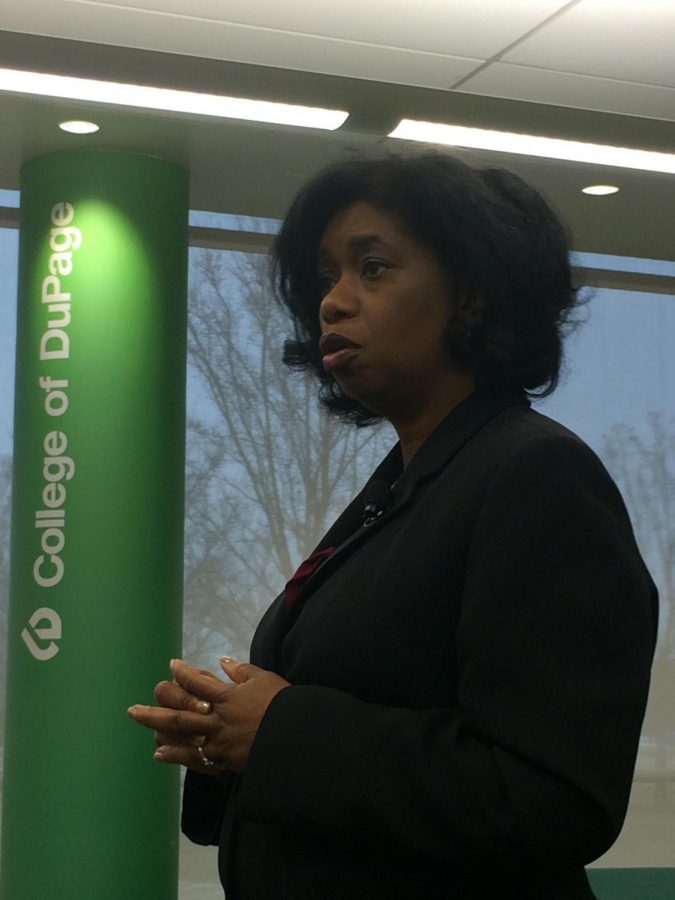Third and final candidate for the associate vice president of student affairs position, Dr. Countance Anderson, shares her vision for the role.
Countance Anderson during a open interview hosted by COD
April 17, 2018
Countance Anderson made it clear her experiences as a former student are a huge part of why she is driven to work at College of DuPage (COD). She spoke candidly about receiving Pell grants and completing her masters and doctorate as a new mother. Helping students just like her is a major goal.
“I look forward to being here,” concluded Anderson, as she wrapped up her open interview for the associate vice president of student affairs position last Friday. “Where the rubber meets the road is where I work best,” she said.
Anderson was the third of three candidates participating in open interviews for the position
Engaging with students and helping them grow up to become mature, independent individuals drives Anderson. Anderson is the director of Registration and Orientation at Jackson State Community College in Tennessee. With a doctorate, a master’s, and a bachelor’s degree, all in Education, she hopes to bring her skills to the table to help COD President Ann Rondeau achieve her vision for the future here at COD.
Anderson has served as an adjunct faculty member alongside her role in strategic enrollment management and describes this as the basis for how she understands a student from both viewpoints. Working with students as the first point of contact after admittance has allowed her to delve into the most pertinent issues that face new enrollees. She believes her role is to help students be engaged with their own academic pathways by guiding them through self-reflection, self-management and the building of self-esteem.
“In order to move students toward student success, yes, we have tremendous initiatives, but really we have to help students figure out who they are,” Anderson said. “Help them help themselves as they go from making decisions about their academics, and into their lifelong pursuits.”
Anderson was asked about her experience working with students and the challenges they face.
“I have tremendous experience amongst students of diverse subgroups,” Anderson said. Anderson’s higher education career began as a recruiter for adult students. She is passionate about helping this group, in particular, having been an adult student herself. She described the importance of helping adult students overcome obstacles such as parenting or affordable accommodation, working through prior learning assessments, and finding ways to help them complete their programs faster. Anderson also recognizes the difficulties that some adult and return students have with managing payment plans. She described alternative plans she worked on, involving smaller increment payment options.
Anderson also has experience working with financial aid. She referred to her own experience as a former “at-risk” student as an example of her deep connection to those students who require more advisement and counselling as they work to achieve their higher education goals. Anderson feels there should be a bridge between orientation and advisement that involves partnering with faculty so students are provided guidance from the get-go. She envisions students working with members of the faculty in their own area of study, who can help them direct a path from enrollment to completion.
“I get that the students need an advocate, they need a voice at the table, somebody that’s going to push and talk up for them,” Anderson said, “This is time for me to bring all of my work and life experiences and bring that to the table here at COD.”
Part of this is helping students manage the cost of education, with exposure to financial literacy and related advising. Anderson described the challenges of helping grant or loan recipients handle the hazards around student debt. She wants to help students make “purposeful choices.”
“How do we invite students to come, tell them the importance of having a college degree, and then not help them through the whole process of being fiscally sound in moving to, and through that journey?” Anderson said.
“I want to take my experience to the next level, to have a greater impact on how they navigate higher education,” Anderson continued. “It’s their hope and dream to be better, and it’s our responsibility to help.”
You can read more about the first open interview with Scott Friedman in our April 11 issue of the Courier, or online at www.codcourier.org.


















